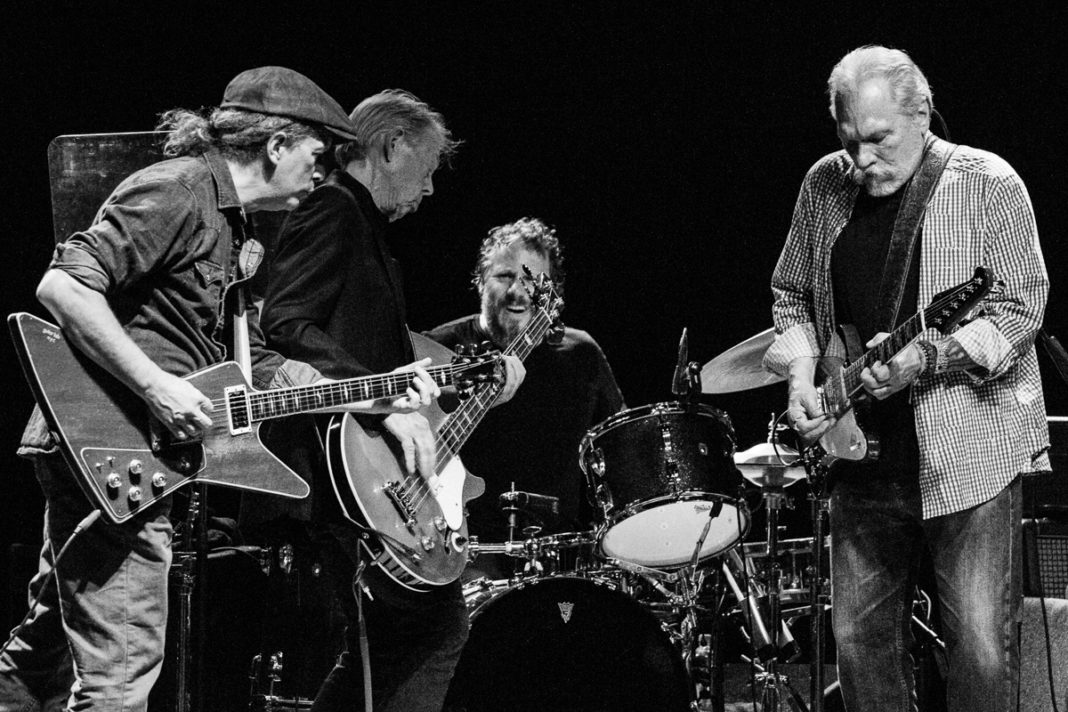Hot Tuna performs a live acoustic show in Asbury Hall at Babeville on Monday December 9, with special guests Larry Campbell & Teresa Williams.
Tickets: $40.00 in advance, $45.00 day of show General Admission seated available at eventrbrite.com, Babeville Box Office (M-F 11a-5p), Terrapin Station, Rust Belt Bookstore, or charge by phone at 877.987.6487. Doors open at 7:00pm, show starts at 8:00pm.
Hot Tuna – Jorma Kaukonen and Jack Casady
– A Living Legend in American Music –
The name Hot Tuna invokes as many different moods and reactions as there are Hot Tuna fans — millions of them. To some, Hot Tuna is a reminder of some wild and happy times. To others, that name will forever be linked to their own discovery of the power and depth of American blues and roots music. To newer fans, Hot Tuna is a tight, masterful duo that is on the cutting edge of great music.
All of those things are correct, and more. For more than four decades, Hot Tuna has played, toured, and recorded some of the best and most memorable acoustic and electric music ever. And Hot Tuna is still going strong — some would say stronger than ever.
The two kids from 1950s Washington, D.C. knew that they wanted to make music. Jorma Kaukonen, son of a State Department official, and Jack Casady, whose father was a dentist, discovered guitar when they were teenagers (Jack, four years younger, barely so). They played, and they took in the vast panorama of music available in the nation’s capital, but found a special love of the blues, country, and jazz played in small clubs.
Jorma went off to college, while Jack sat in with professional bands and combos before he was even old enough to drive, first playing lead guitar, then electric bass.
In the mid-1960s Jorma was invited to play in a rock‘n’roll band that was forming in San Francisco; he knew just the guy to play bass and summoned his old friend from back east. The striking signature guitar and bass riffs in the now-legendary songs by the Jefferson Airplane were the result.
The half-decade foray into 1960s San Francisco rock music was for Jack and Jorma an additional destination, not the final one. They continued to play their acoustic blues on the side, sometimes performing a mini-concert amid a Jefferson Airplane performance, sometimes finding a gig afterwards in some local club. They were, as Jack says, “Scouting, always scouting, for places where we could play.”
The duo did not go unnoticed and soon there was a record contract and not long afterwards a tour. Thus began a career that would result in more than two-dozen albums, thousands of concerts around the world, and continued popularity.
Hot Tuna has gone through changes, certainly. A variety of other instruments, from harmonica to fiddle to keyboards, have been part of the band over the years, and continue to be, varying from project to project. The constant, the very definition of Hot Tuna, has always been Jorma and Jack.
The two are not joined at the hip, though; through the years both Jorma and Jack have undertaken projects with other musicians and solo projects of their own. But Hot Tuna has never broken up, never ceased to exist, nor have the two boyhood pals ever wavered in one of the most enduring friendships in music.
Along the way, they have been joined by a succession of talented musicians: Drummers, harmonica players, keyboardists, backup singers, violinists and more, all fitting with Jorma and Jack’s current place in the musical spectrum. Jorma and Jack certainly could not have imagined, let alone predicted, where the playing would take them. It’s been a long and fascinating road to numerous, exciting destinations. Two things have never changed: They still love playing as much as they did as kids in Washington, D.C. and there are still many, many exciting miles yet to travel on their musical odyssey.
Larry Campbell & Teresa Williams
Multi-instrumentalist, singer-songwriter Larry Campbell and singer-guitarist Teresa Williams’ acclaimed eponymous 2015 debut, released after seven years of playing in Levon Helm’s band – and frequent guesting with Phil Lesh, Little Feat, Jorma Kaukonen and Jack Casady, brought to the stage the crackling creative energy of a decades-long offstage union. A whirlwind of touring and promo followed, and when the dust cleared, the duo was ready to do it all again. Which brings us to Contraband Love, a riskier slice of Americana.
Larry, who produced Contraband Love, says, “I wanted this record to be a progression, bigger than the first one. That’s all I knew. I wanted the songwriting to be deeper, the arrangements more interesting, the performances more dynamic. Specifically how to get there, I didn’t know. I did know the songs were different. The subject matter was darker than anything else I’ve written.”
“More painful!” Teresa says, and laughs.
“Yeah,” Larry says with a smile. “I’m proud of our debut, but I felt like the songs were lighter than what I’m capable of doing. As a songwriter, I aspire to a sense of uniqueness: this is a great song and it could only have been written by me. I want to get there. It’s a journey, a goal, a pursuit. The mechanics of that pursuit are figuring out what you need to do to surpass your last body of work.”
Although it was not his conscious intent, three of the eight tunes Campbell penned for Contraband Love deal either obliquely or directly with various emotions surrounding addiction. For the blues rocking “Three Days in A Row,” he authoritatively delves into the crucial first seventy-two hours directly following an addict going cold turkey in an effort to get clean. “I was thinking about the things I’ve quit in my life,” he says. “The last time was cigarettes. I remembered the dreams I had in withdrawal.” Vintage-sounding country nugget “Save Me from Myself” (featuring Little Feat’s Bill Payne on piano) explores a troubled soul’s heartrending knowledge that they are hard to love. “I’ve certainly felt both sides of that situation,” Larry says, “and observed it many times.” Delicate waltz “Contraband Love,” a captivating vocal showcase for Teresa, takes on the other side of the story, when a parent (or spouse, or friend, etc.) realizes their only recourse for dealing with an addict is merely to stand “with arms wide open.” Of this remarkable piece, Larry says, “That melody would not leave me alone. It’s one of the more unique songs I’ve ever written.”
“Larry’s writing this stuff,” Teresa says, “and we’re naming off all the people in our lives who are currently going through this (addiction and loss) with a loved one, not to mention the family members and friends we’ve lost in the past from this affliction. That may have driven him. One of my oldest, most intimate friends – a functioning substance abuser since he was a teenager – died on the street in New York while we were in the studio. We dedicated the album to him.”
“The stuff of loss resonates,” Larry says.
Musically, Contraband Love revisits the Americana textures of the duo’s debut, deftly channeling Memphis, Chicago, the Delta, and Appalachia with equal assurance. Larry’s world-famous guitar work – scorching here, funky there, stellar always – punctuates the proceedings with riveting emotion, often like a third voice weighing in on a myriad of emotional states.
The barnburner leadoff single, “Hit and Run Driver,” is a harrowing-but-rocking survivor’s tale, showcasing longtime drummer and engineer/mixer Justin Guip.
To leaven out the darker tunes, Larry and Teresa added a recording of the reassuring Carl Perkins country classic “Turn Around,” with old friend and mentor Levon Helm, captured on drums shortly before his passing. Jaunty folk blues “My Sweetie Went Away,” features new bass player Jesse Murphy doubling on tuba for a distinctly New Orleans feel; traditional gutbucket country blues “Delta Slide,” is spiced with irresistible, harmonized yodeling.
“Stylistically, there’s a lot of different things going on,” Larry says. “So the sequencing was difficult. But I think I got it right.”
Indeed. Contraband Love stands as a new, bolder chapter in a story that arose triumphantly joyous from loss. “When Levon died,” Teresa says, “that put Larry into high gear. He’d already had his head set about making a record, but then it felt like a train took off! We just said, ‘life is short.’”
Another motivator for creating Contraband Love was the experience of taking the Larry Campbell and Teresa Williams show out on the road, as a duo, with a band, and opening for Jackson Browne (who loaned them his band). “It felt fabulous and fantastic,” Larry says. “After I met Teresa (in the mid 80s), I’d be out with Bob Dylan and something was missing. I gotta gig, and it’s what I always wanted, but it’s not my stuff, and it’s not with the person I want to be with. And then, when we got a taste of being a performing duo at the Rambles with Levon, the idea that we could expand on that was completely alluring.
“So virtually everything we’ve done musically since I left Dylan’s band, we’ve been asked to do together: Levon, Phil and Friends, Jorma and Jack, Little Feat; we’ve done it all as a unit, a duo, and it’s great. It’s rewarding on a lot of levels. The way I see it, when Teresa and I are together, doing our material for people who come to see us, then everything I ever wanted out of life is pretty well complete.”


